|
As both a transgender woman and an experienced Anglican priest, it is highly disappointing to hear of the recent resolution of the Anglican Synod of Tasmania about what it calls ‘Biological Sex’. This betrays all the faults of what was a very late ‘motion without notice’: being ill-considered, under-informed and divisive, especially in its lack of attention to Anglican and other transgender people’s own well-substantiated experiences of faith and identity. For both Tasmania and the Anglican Communion are blessed with many wonderful transgender people who continue to enrich our communities and bring new life to others. What a difference it then makes when we are listened to and engaged constructively. For my own experience is that, in affirming rather than denying our authentic God-given (not human labelled) gender, transgender people are indeed so much more fully incarnate, at peace and flourishing in our skins, biology and divine purpose. Denying this not only helps maintain unnecessary suffering but restricts the love and joy we have to share within the Church and wider world. After all, St Paul (in 1 Corinthians 12) encouraged the Church, as the Body of Christ, to value its members that are weaker and shamed. This kind of action however feels more like being freshly beaten up and an attempt to cut off transgender members, our families and friends. That is not the message of God’s love that Christians have to offer the world.
The resolution also seems to reflect a recently constructed approach to the Bible which narrows God’s colourful and dynamic kaleidoscope of creation to simplistic black and white binary categories. This does not do justice to how mainstream Anglican theology has typically sought to value the rich and varied textures of the scriptures and the best of evolving human reason. Nor does it sit well with increasingly trans affirming developments in many Anglican dioceses, and other Christian congregations, schools, and agencies across Australia. I hope therefore that Anglican leaders in Tasmania will think again and not encourage their parishes, schools, and other agencies to take such an unhelpful path. The same Synod passed other resolutions making a continuing welcome commitment to addressing environmental challenges and supporting people with disabilities. These are just two of many ways in which Tasmanian Anglicans contribute positively to their communities. What a shame transgender people are not yet regarded as worthy of similar full respect and engagement. For neither trans people nor people of faith benefit from perpetuating today’s unnecessary culture wars, especially those of us who are both. Human beings have genuine differences but, as St Paul also put it, we are called to be one in Christ, in whom ‘there is no longer male and female’. We can be, and do, so much more together. The Revd Dr Josephine Inkpin was ordained in the Church of England in 1986 and has served in many capacities in Anglican dioceses in England and, since 2001, in Australia, as well as an officer of the National Council of Churches in Australia for several years. She is an associate lecturer in the University of Divinity, a member of the global network of Trans and Non-Binary Clergy of the Anglican Communion, and the current Minister of Pitt Street Uniting Church in Sydney.
1 Comment
How do you regard dragonflies? In one of his great poems (As Kingfishers Catch Fire), the poet Gerard Manley Hopkins not only encourages us to be like them, but, in so doing, to be like Christ. Not everyone has always agreed however. In early colonial Australia for example, white fellas tried to kill dragonflies, just as they/we tried to kill so many other life-giving things that they/we did not understand. Those early colonialists saw dragonflies flying around and landing on their valuable horses, and they saw the horses moving and flicking their tails. So they thought the dragonflies were biting and making them crook. The colonialists were making things worse. The dragonflies were actually eating the mosquitoes and the gnats that were troubling the horses. They were life-givers, saviours even, not devils in disguise. In so many positive ways, dragonflies are thus evocative symbols for transgender people today. For, on this Transgender Day of Remembrance, we do well to attend to how bearers of light have been treated as embodiments of darkness. We do well, as our Gospel today (Luke 23.32-43) reminds us, to remember how Jesus was not crucified alone, and how others are also crucified today. And above all, we do well to affirm that it is only in recognising the light, in strange places, that we find salvation and hope for us all…
This photo was taken, earlier this year, from my bed of healing in a delightful unit in St Kilda (Melbourne), I had just had genital reconstruction surgery, thanks to the excellent skills of Andy Ives and his wonderful team at the nearby Masada Hospital, and I was in my first stages of recovery 'at home'. When the night's darkness began to lift, the new light of day brought this beautiful dawn. My eyes opened to the glorious gift of nature's renewal, and, with it, to the wonder of human participation in the joy of existence and work of re-creation. For across the sky, just above the treeline, floated a series of hot air balloons, beautiful expressions of fresh lightness and delight (you may just be able to spot two of them in the photo - as small circles to the left of the centre of the light, adjacent to the word alleluia).. At the same time, the sunrise further gorgeously illuminated the cranes working on the building of the exciting development of the Victorian Pride Centre, visible a couple of streets away across the rooftops.
This experience was, as might be imagined, for me, a vision and harbinger of resurrection. It did not take away the struggles I was going through. The surgery itself was very successful, and there was not a subsequent shred of regret (so much the reverse), the days to come also saw pain and discomfort, particularly with an awkward infection and slow completion of healing due to sensitive skin (part of the joy of being a particular kind of natural redhead?!). The struggles of gender & sexually diverse people are also hardly over, despite such welcome living symbols of resurrection as the Pride Centre. Yet that dawn was not only a moment of special grace, but also a deep sign of hope and loving transformation, not simply for myself but for so much else about which I care. For resurrection, at least in this life and time space, is always betwixt and between... 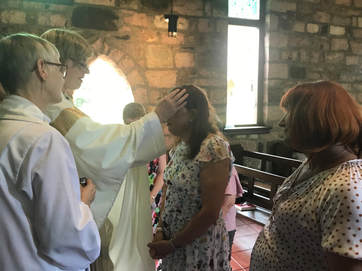 Some days we can glimpse why we were put on this earth. Yesterday was one such moving moment for me, as I led a short rite for a soul friend preparing for gender affirmation surgery. We made no extra special great fuss about this. Nor should we have to, for such signs of grace for LGBTI+ people are really very natural, if our world would but allow itself to know it. Yet it was profoundly significant in the journeys we are making at this time. For today's sea-change of understanding gender and sexuality not only brings healing and hope to specific individuals. It also offers vital hope and healing to tired aspects of our society, not least to religious groups and their members. In a profound sense it is thus sacramental: helping to reveal what has been hidden, opening up and helping to sustain fresh pathways of life and transformation. Our short rite yesterday was like that. It publicly honoured deep movements of life and spiritual wrestling which have not only been unacknowledged and unsupported, but often tragically dismissed and disastrously resisted. It also proclaimed that new life for all of us is to be found in the tender solidarity of us all, in the mystery of God's extraordinary and abundant grace and diversity. Our 'transgender' rite was just a small part of our usual Milton Anglicans Sunday parish eucharist. As such however, it was no 'hole in the wall' secret ceremony, but a truly grounded and open affirmation both of a remarkable sacred particular person and of our growing sense of what it means to re-create community and 'church' today. It felt like a renewing movement of spirit for our community, certainly for my own sense of priesthood, and a re-presentation of what it means to be differently ordered bodies together in the body of Christ. It also made us wonder why such things are not expected in the life of all spiritual communities... 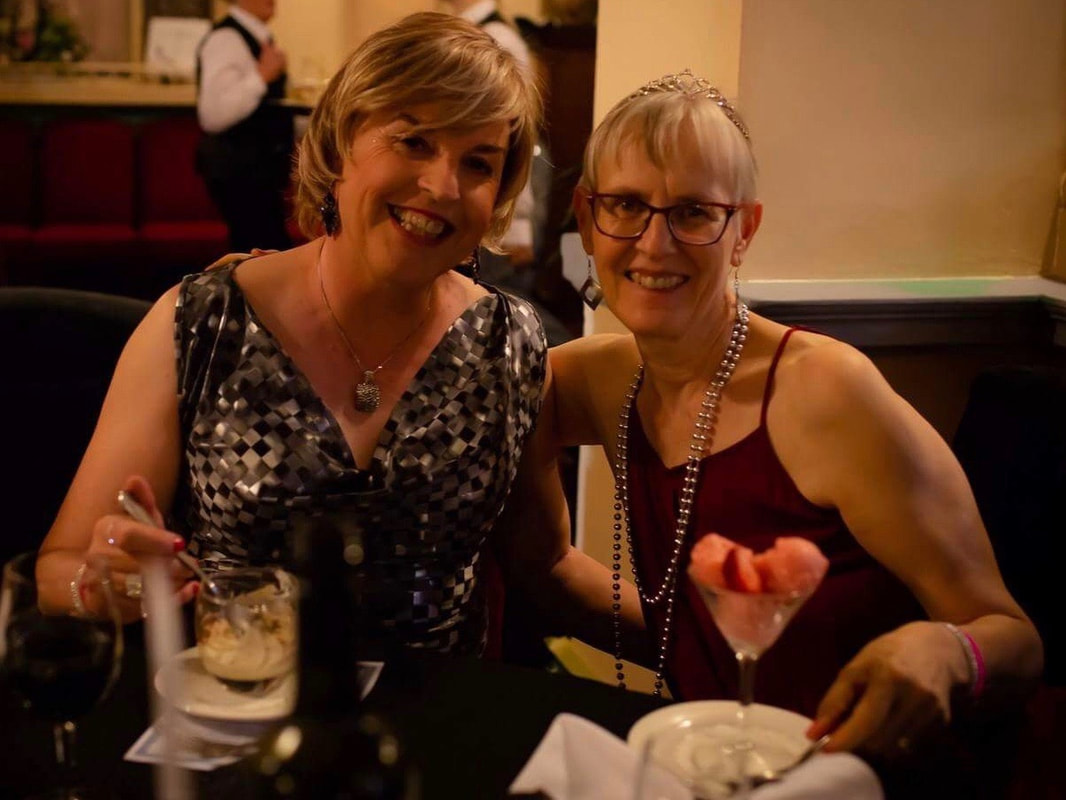 In times to come it will be extraordinary to imagine that some Christians insisted on married transgender people divorcing if they wished to claim their full identity. How scandalous a betrayal of God's love and Christ's teaching this is! It has been a long journey to address this in secular law in Australia and, sadly, the battle is not over in some religious quarters as well as in many parts of the world. Queensland, in which I now live, thankfully finally changed its law last night (with only four votes against, from the fringe Katter and One Nation parties). Hitherto, married transgender people have had to divorce if they changed their birth certificate to their true gender. I rejoice for friends and others who will directly benefit from this. For I know the pain this law has caused and have personally therefore lobbied hard for change. It will also be an encouragement for other necessary steps forward and for more religious people to come to their senses and renew their understanding both of marriage and of people of gender diversity. I write this with feeling, as well as after deep reflection on these subjects. For the status of my own marriage is under question in some slowly moving and blinkered parts of the Church, even in Australia itself. A leading member of the Anglican Diocese of Sydney for example has even gone so far as to challenge both my marriage and the ministry of my wife and I as 'living contrary' to the doctrine of Christ - see further transgender and the doctrine of marriage in Brisbane. Of course, in that instance, the aim is a distinctly political one: to attack my archbishop, my diocese and the mainstream pastoral approach and unfolding theology of the Anglican Communion as a whole. Yet such 'stop the world, we want to get off' thinking will not work. The ground is shifting in religious spheres too, as the actual lived experience of transgender people and their loved ones is gradually being revealed. Anglicans and other Christians across the world are responding, if sometimes hesitatingly, burdened as we are too much by our often exacting processes and the frenzied reactions of some. The Church of England for example, the church of my birth, has declared that it fully welcomes me and other transgender people, at every level of its life. As its leadership have expressed it (with my emphasis): The House of Bishops welcomes and encourages the unconditional affirmation of trans people, equally with all people,within the Church, the body of Christ,and rejoices in the diversity of that one body, into which all Christians have been baptized by one Spirit. My concern however is not with politics but with the love of God in people's lives. For, in some ways, in the face of such great odds, transgender people are still 'living miracles' even to exist at all - and some of us, tragically, do not make it. Our relationships are also always challenged, and sometimes shattered, by becoming more fully the people God has created and called us to be. The misery of rejection some of my gender diverse friends endure cuts me to the heart. So why would we not seek to strengthen those relationships which have not only worked through demanding change but have emerged stronger? In my case, and in others I know, my marriage is so much deeper for the full truth we live together. My wife could long see that we were suffering unnecessarily for years: 'where has Josephine gone?' she would say when I struggled to come to terms with myself. She knew, better than I, what I, and we together, needed. No marriage is 100% perfect, and I do not pretend to be a moral paragon in my relationships in the past or present, but it is insulting, as well as disappointing, when fellow Christians cannot recognise that my marriage, of 33 years to date, is not a rich example of God's sacramental love to the world (nb. that is my wife and I above in case such a picture is needed). In transitioning, I and others have not chosen (as has been alleged) 'to challenge the Biblical view of marriage' or to place my archbishop, or any one, 'in a difficult position'. Rather, we have simply sought to respond more fully, faithfully, with the whole of our being (as human beings, Christians, and priests), to the love of God for us. Of course, this means that we need to renew some aspects of received understanding. That however is the history of Christianity, as well as that of humanity as a whole, as we have developed our theology of marriage over 2000 years: working through inherited patriarchy and polygamy, rejecting women's subordination (and, for most of Christian history, lack of legal rights), developing compassion and legal recourse for those trapped in violent or unhealthy marriages, and embracing what is good in companionate relationship. Moving beyond the pressing past survival and scarcity preoccupations which informed obsessions with procreation and cis and hetero-normativity, our liturgies today increasingly reflect the wisdom we have gained and the love to which we aspire. There is a desperate resort of late to seeking proof-texts, such as Genesis 1.27 and Matthew 19.5, which may turn back the waters. However, apart from the inability of such texts to be bear the strain (even when isolated from their context and the weight of scholarship), this only confirms such Christianity as a latter day Canute, fruitlessly resisting a sea-change of love and affirmation. I therefore urge all people of faith similarly to affirm unconditionally the lives, marriages and loving relationships of transgender people. Rather than be anxious, never mind put stumbling blocks in our lives (or worst still 'conversion' therapies), why not work with us at providing appropriate pastoral resources to strengthen our relationships? We certainly need them. Listen, educate, and above all hear and affirm the love and faith we have to share. It is astonishing to me that Christians would not want to see healing and the renewal of such love for others. Marriage, like the sabbath, as Jesus might have said, is not made to subjugate the wondrous diversity of human life into a constricting bed of pain. Marriage, at least for Christians, is made for God's renewing of humanity. 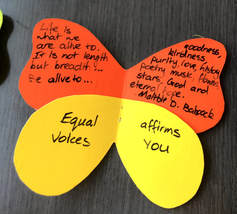 one of the Equal Voices life-giving butterflies created by a beautiful Brisbane defender against the dark arts one of the Equal Voices life-giving butterflies created by a beautiful Brisbane defender against the dark arts Some days I am staggered at how demented (I use the word advisedly) and upside-down our world is! Three of the greatest mental illnesses of our day, for example, are homophobia, biphobia and transphobia. How strange it is therefore that it the victims and survivors of them who are often tarred with the mental illness brush. Indeed it is not so long since being trans was listed worldwide as a mental ill-health condition and today there are still requirements of seeing psychologists and/or psychiatrists and/or other doctors for some treatments. Rarely however do we see calls for treatment for those who perpetrate such outrageous transphobic, biphobic and homophobic comments and actions. To some of them we even give status and attention, as leading politicians, religious and other cultural leaders. Increasingly therefore we need to continue to work on what, borrowing from Harry Potter imagery, we may call 'Defence Against the Dark Arts'. This, for me, is part of what is represented by IDAHOBIT (the International Day Against Homophobia, Biphobia, and Transphobia), marked each year on 17 May. Our task together, on this and every day, is to call out the Dementors of our world and nurture the 'divine magic' of compassion and creativity in us all.. 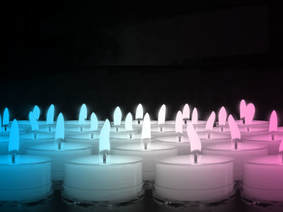 What does remembering mean for gender diverse people and the body of Christ? I ask that question because, on this All Saints Day, we begin a period of remembrance in both church and world: not least of saints, heroes and role models; of loved ones departed; of the destruction of war; and (in the Transgender Day of Remembrance on 20 November) of transgender and gender diverse people murdered across the globe. My sense is that these things are not unconnected and that they come together because (whatever kind of spirituality we have) all human beings need some dedicated time and space in the cycles of the seasons to engage in what is the 'sacred' task of re-membering. November works, globally, for us all in this: for in the southern hemisphere it marks the drawing to the close of the working year and, in the northern, it marks the coming of the darkness of winter. Not for nothing have human beings also traditionally begun preparing for a mid or end of year festival of light and celebration (known variously but to most today as Christmas). To do that properly however - particularly where death, violence, loss, grief and/or family separation are still real - we need to re-member. So what truths, healing and fresh purpose are we seeking to affirm, and receive, in this, as gender diverse people?... |
AuthorThe Revd Dr Jo Inkpin: Archives
March 2024
Categories
All
|
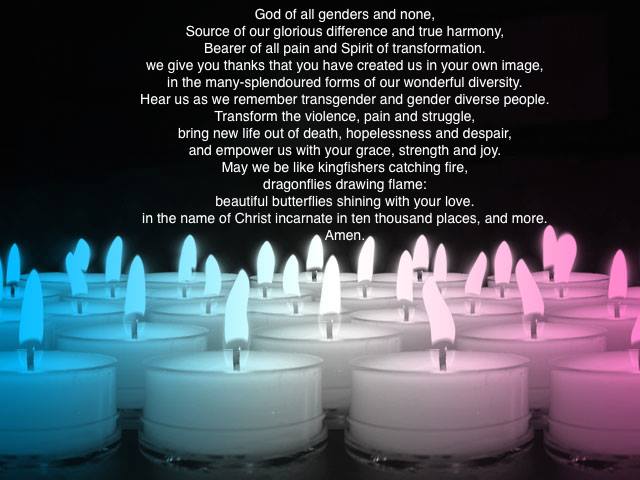
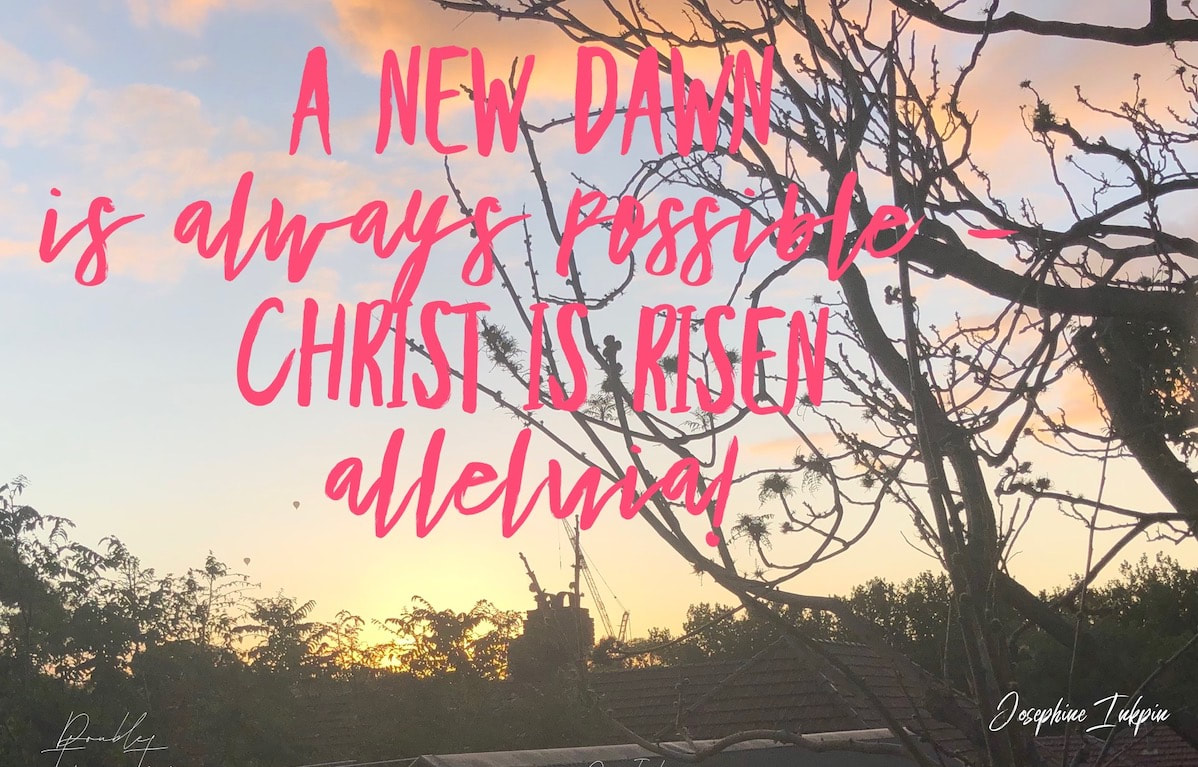
 RSS Feed
RSS Feed